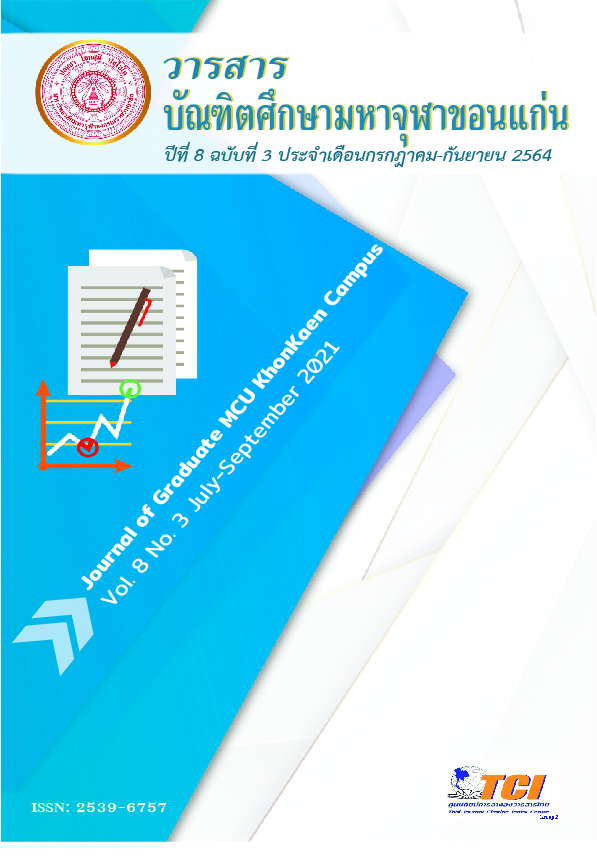การวิเคราะห์เสรีภาพของฌ็อง-ปอล ซาร์ตร์
Main Article Content
บทคัดย่อ
บทความวิชาการนี้ มีวัตถุประสงค์เพื่อวิเคราะห์เสรีภาพของของฌ็อง-ปอล ซาร์ตร์ ผลการศึกษาพบว่า เสรีภาพที่แท้จริงต้องเป็นเจตจำนงที่ไม่ถูกกำหนดด้วยสิ่งใดสิ่งหนึ่งในการตัดสินใจเลือกกระทำหรือไม่เลือกกระทำสิ่งใดสิ่งหนึ่ง ซึ่งซาร์ตร์เชื่อว่ามนุษย์ถูกสาปให้มีเสรีภาพ มนุษย์กับเสรีภาพจึงเป็นสิ่งเดียวกัน เมื่อทุกคนมีเสรีภาพในตัวเองจึงไม่มีเงื่อนไขใด ๆ ภายนอกสามารถกำหนดการตัดสินใจเลือกกระทำของมนุษย์ได้ ทุกสิ่งล้วนขึ้นอยู่กับศักยภาพในการค้นหาตัวตนของมนุษย์เอง เสรีภาพของซาร์ตร์มีมาพร้อมกับความรับผิดชอบต่อตนเองและสังคม ความรับผิดชอบจึงเป็นสิ่งสำคัญที่จะทำหน้าที่กำกับในการตัดสินใจเลือกหรือไม่เลือกกระทำนั้น และพร้อมที่จะยอมรับผลของการเลือกกระทำนั้นด้วยเช่นกัน เสรีภาพตามความหมายของซาร์ตร์จึงอยู่บนพื้นฐานความมีอิสระที่จะเลือกกระทำสิ่งใดสิ่งหนึ่งทั้งที่เป็นสิ่งดีและไม่ดีอันอยู่ภายใต้ความรับผิดชอบผลของการกระทำต่อตนเองและสังคม
Article Details
เอกสารอ้างอิง
ราชบัณฑิตยสภา. (2560). พจนานุกรมศัพท์ปรัชญา อังกฤษ-ไทย ฉบับราชบัณฑิตยสภา. กรุงเทพมหานคร: สำนักงานราชบัณฑิตยสภา.
พระพรหมคุณาภรณ์ (ป.อ. ปยุตฺโต). (2557). พุทธธรรม. กรุงเทพมหานคร: มหาวิทยาลัยมหาจุฬาลงกรณราชวิทยาลัย.
พินิจ รัตนกุล. (2549). ปรัชญาชีวิต ฌอง ปอล ซาร์ตร์. กรุงเทพมหานคร: สามัญชน.
พระเมธีธรรมาภรณ์ (ประยูร ธมฺมจิตฺโต). (2536). เปรียบเทียบแนวคิดพุทธทาส-ซาตร์, กรุงเทพมหานคร: ศยาม.
วิทย์ วิศทเวย์. (2553). ปรัชญาทรรศน์: พุทธปรัชญา. กรุงเทพมหานคร: จุฬาลงกรณ์มหาวิทยาลัย.
ศักดิ์ บวร. (2559). ปรัชญาของซาร์ตสำหรับผู้เริ่มเรียนรู้. กรุงเทพมหานคร: เคล็ดไทย.
สมภาร พรมทา. (2545). มนุษย์กับการแสวงหาความจริงและความหมายของชีวิต. กรุงเทพมหานคร: ศยาม.
Jean Paul Sartre. (1973). Translated by Phillip Mairet, Existentialism and Humanism,
London : Eyre Methuen Ltd.
Lawrence E. Cahoone. (1998). From-modernism-to-postmodernism an anthology, Oxford : Blackwell Publisher.

